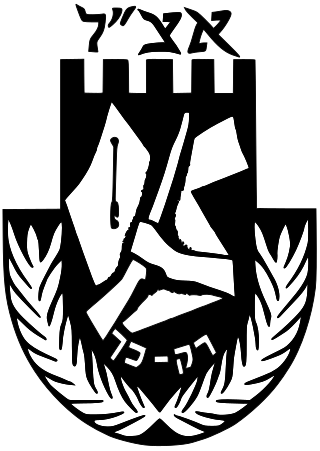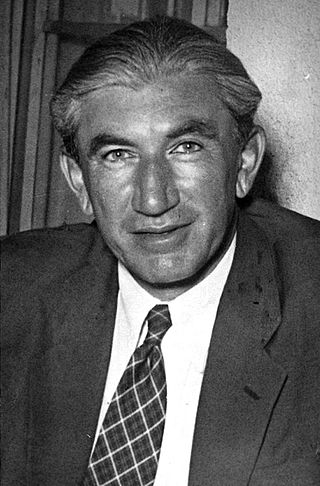Related Research Articles

The Irgun, or Etzel, was a Zionist paramilitary organization that operated in Mandatory Palestine between 1931 and 1948. It was an offshoot of the older and larger Jewish paramilitary organization Haganah. The Irgun has been viewed as a terrorist organization or organization which carried out terrorist acts.
Haganah was the main Zionist paramilitary organization that operated for the Yishuv in the British Mandate for Palestine. It was founded in 1920 to defend the Yishuv's presence in the region, and was formally disbanded in 1948, when it became the core force integrated into the Israel Defense Forces shortly after the Israeli Declaration of Independence.

The Jewish Legion was an unofficial name used to refer to five battalions of the British Army's Royal Fusiliers regiment, which consisted of Jewish volunteers recruited during World War I. In 1915, the British Army raised the Zion Mule Corps, a transportation unit of Jewish volunteers, for service in the Gallipoli campaign. Two years later in August 1917, the decision was made to raise an infantry battalion of Jewish soldiers which would be integrated into an existing British Army regiment.

The Jewish Infantry Brigade Group, more commonly known as the Jewish Brigade Group or Jewish Brigade, was a military formation of the British Army in the Second World War. It was formed in late 1944 and was recruited among Yishuv Jews from Mandatory Palestine and commanded by Anglo-Jewish officers. It served in the latter stages of the Italian Campaign, and was disbanded in 1946.

Yehuda Arazi, code name Alon, was an Israeli who was active in the Haganah in Palestine during the British Mandate era.

Mordechai (Motke) Maklef was the third Chief of Staff of the Israel Defense Forces (IDF) and later, director-general of many important public companies in the Israeli economy.

Meir "Zarro" Zorea MC was a general in the Israel Defense Forces (IDF) and later a member of the Knesset. He earned distinction through his combat actions in World War II and in the 1948 Arab-Israeli War. He was a founder of Democratic Movement for Change, an initially successful but short-lived centrist party.

Bricha, also called the Bericha Movement, was the underground organized effort that helped Jewish Holocaust survivors escape Europe post-World War II to the British Mandate for Palestine in violation of the White Paper of 1939. It ended when Israel declared independence and annulled the White Paper.

The Patria disaster was the sinking on 25 November 1940 by the Jewish paramilitary organization Haganah of a French-built ocean liner, the 11,885-ton SS Patria, in the port of Haifa, killing 267 people and injuring 172.

Enzo Sereni was an Italian Socialist Zionist, co-founder of kibbutz Givat Brenner, celebrated intellectual, advocate of Jewish-Arab co-existence and a Jewish Brigade officer who was parachuted into Nazi-occupied Italy during World War II, captured by the Germans and executed in Dachau concentration camp.

The Special Night Squads (SNS) was a joint British–Jewish counter-insurgency military unit, established by Captain Orde Wingate in Mandatory Palestine in 1938 during the 1936–1939 Arab revolt. The SNS basically comprised British infantry soldiers, together with some men drawn from the Jewish Supernumerary Police. Total unit strength was 100 by 1938.

Yitzhak Sadeh, was the commander of the Palmach and one of the founders of the Israel Defense Forces at the time of the establishment of the State of Israel.

Shlomo Gazit was an Israeli military officer and academic. A Major General in the Israel Defense Forces, he headed Israel's Military Intelligence Directorate. He later served as president of Ben-Gurion University and director general of the Jewish Agency.

Nakam was a paramilitary organisation of about fifty Holocaust survivors who, after 1945, sought revenge for the murder of six million Jews during the Holocaust. Led by Abba Kovner, the group sought to kill six million Germans in a form of indiscriminate revenge, "a nation for a nation". Kovner went to Mandatory Palestine in order to secure large quantities of poison for poisoning water mains to kill large numbers of Germans. His followers infiltrated the water system of Nuremberg. However, Kovner was arrested upon arrival in the British zone of occupied Germany and had to throw the poison overboard.

A successful paramilitary campaign, sometimes referred to as the Palestine Emergency, was carried out by Zionist underground groups against British rule in Mandatory Palestine from 1944 to 1948. The tensions between the Zionist underground and the British mandatory authorities rose from 1938 and intensified with the publication of the White Paper of 1939. The Paper outlined new government policies to place further restrictions on Jewish immigration and land purchases, and declared the intention of giving independence to Palestine, with an Arab majority, within ten years. Though World War II brought relative calm, tensions again escalated into an armed struggle towards the end of the war, when it became clear that the Axis powers were close to defeat.

The Deir Yassin massacre took place on April 9, 1948, when Zionist paramilitaries attacked the village of Deir Yassin near Jerusalem, Mandatory Palestine, killing at least 107 Palestinian villagers, including women and children. The attack was conducted primarily by the Irgun and Lehi, who were supported by the Haganah and Palmach. The massacre was carried out despite the village having agreed to a non-aggression pact. It occurred during the 1947-1948 civil war and was a central component of the Nakba and the 1948 Palestinian expulsion and flight.

Tilhas Teezee Gesheften was a group of Jewish Brigade members formed immediately following World War II. Under the guise of British military activity, this group engaged in the assassination of Nazis and SS conspirators, facilitated the illegal emigration of Holocaust survivors to Mandatory Palestine, and smuggled weaponry for the Haganah.
Moshe Tavor was a member of the Jewish Brigade, a unit of the British Army that fought the Germans in Italy in 1944-45. Tavor and others in the unit resolved to take justice into their own hands and pay back the Germans for the atrocities the German army had committed. Using whatever information they could find, they tracked down Germans who, they believed, had participated in killing Jews, and then - wearing British Military Police uniforms they had acquired to give the misleading impression they were conducting an official inquiry - took their captives to isolated places in the forests and executed them, usually by strangulation. Tavor stated, a year or so before his death, that he did not "regret" committing murder without a proper trial, he only regretted what they "didn't do" to their victims.
Zivi Tzafriri 8 July 1927 – 1 November 1956, was an Israeli Armor Corps officer who was killed during the Sinai War.
Gmul ('Recompense') was a short-lived secret unit created in the Jewish Brigade in 1945 at the end of World War II to identify and kill Germans, particularly SS members, who had taken part in atrocities against Jews. In their three months of operations, they assassinated 100 to 200 Nazi war criminals. Eventually, the British, having received complaints about the disappearances, forced an end to the killings.
References
- ↑ The Brigade, Blum p16 / 27
- ↑ Blum p26
- ↑ M. Beckham The Jewish Brigade p27
- ↑ Blum p.26
- ↑ Blum p.26
- ↑ Blum p27 / 28
- ↑ Blum p27 / 28 / 29
- ↑ Soshuk Levi Momentous Century p122
- ↑ Blum p27 / 28 / 34 / 39
- ↑ Blum p. 28
- ↑ Blum. p28/29
- ↑ Blum p30
- ↑ Blum p126
- ↑ Blum p16
- ↑ Soshuk p224
- ↑ Blum p10
- ↑ Blum p25
- ↑ Blum p139
- ↑ Blum p153 and p156
- ↑ Blum p161
- ↑ Blum p170
- ↑ Blum p170-172
- ↑ Blum p171-172 and 174-178
- ↑ Blum 172
- ↑ Blum 176
- ↑ Blum p178
- ↑ Blum p178
- ↑ Blum p185
- ↑ Blum184-185
- ↑ Blum 185
- ↑ Blum p196 / p198 / p200